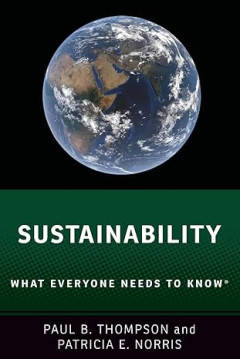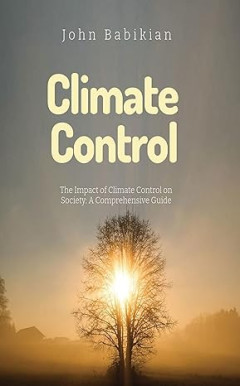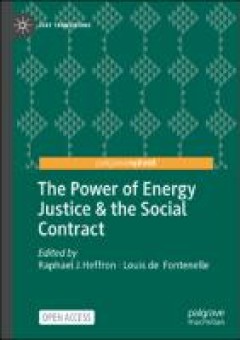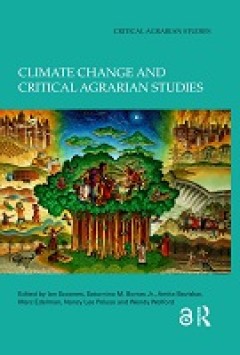Ditapis dengan
E-book Building an Inclusive, Green and Low-Carbon Economy
The importance of global climate change in the international agenda is constantly increasing. All the countries have reached a basic consensus on actively implementing international conventions, strengthening climate targets and practical actions, despite the impact of the pandemic and short-term recovery. Under this background, the 26th Conference of the Parti…
- Edisi
- -
- ISBN/ISSN
- 9789811998614
- Deskripsi Fisik
- 512 hlm
- Judul Seri
- -
- No. Panggil
- 621.042 YIN b
E-book Hydropower and Renewable Energies: Synergistic Integration for Future …
This open access book explores the complementarity of hydropower with new energy sources such as solar and wind in the global energy transition. It analyzes the technological advantages, environmental impacts, and economic potential of combining hydropower and new energy sources, while examining the related policies and market mechanisms. Through a multidimensional approach, the book demonstrat…
- Edisi
- -
- ISBN/ISSN
- 9789819791842
- Deskripsi Fisik
- 601 halaman
- Judul Seri
- -
- No. Panggil
- 531.6 ZHE h
E-book Wind Power Deployment in Urbanised Regions : An Institutional Analysis…
In 2014, the Intergovernmental Panel on Climate Change (IPCC) warned that continued emission of greenhouse gases would have severe impacts on people and ecosystems. However, the implementation of climate policies is being delayed. Despite the growing number of policies to mitigate climate change, global emissions have been rising to ‘unprecedented levels’(IPCC, 2014). In reaction to this wo…
- Edisi
- -
- ISBN/ISSN
- 9783854480334
- Deskripsi Fisik
- 238 hlm
- Judul Seri
- -
- No. Panggil
- 621.042 NAB w
E-book Engaging Environments in Tonga : Cultivating Beauty and Nurturing Rela…
In October 1986, Kotu Island in the Lulunga district of the Tongan group of Ha‘apai appeared as a low silhouette on the Western horizon as the small boat we were in weaved its way through a channel in the fringing reef into the large lagoon surrounding the island for the first time. The tide was low, and the boat scraped the bottom and ground to a halt long before r…
- Edisi
- -
- ISBN/ISSN
- 9781805390657
- Deskripsi Fisik
- 246 hlm
- Judul Seri
- -
- No. Panggil
- 333.79612 PER e
E-book Climate Lyricism
Whenever i think about climate change, which is often, I strug-gle to make sense of its enormity. So much seems to be at stake. Maybe everything. And there’s not a lot of time to try to blunt its most destructive impacts. Yet I don’t know if anything I do matters. I feel powerless. I run through the routine of my days, scurrying from one activity to the next wh…
- Edisi
- -
- ISBN/ISSN
- 9781478022350
- Deskripsi Fisik
- 257 hlm
- Judul Seri
- -
- No. Panggil
- 333.7 HYO c
E-book Carbon Pricing in Japan
The Paris Agreement adopted in December 2015 sets out the trend toward decar-bonization, which calls for net zero GHG emissions by the latter half of this century.Along with this trend not a few countries have set ambitious emission reductiontargets to address it, and among them Japan officially set an 80% reduction target for greenhouse gas (GHG) emissions by 2050 in the Plan for Global Warmin…
- Edisi
- -
- ISBN/ISSN
- 9789811569647
- Deskripsi Fisik
- 271 hlm
- Judul Seri
- -
- No. Panggil
- 621.042 KOJ c
E-book The Impact of Climate Change on Vulnerable Populations : Social Respon…
Climate change threatens the physical and mental health of vulnerablecommunities and can have a significant impact on their livelihoods. Climate changecan also deepen existing social and economic inequities and contribute to the erosionof coping skills and resilience. Transformative social and economic responses basedon inclusion and dialogue with members of the community are needed in such ane…
- Edisi
- -
- ISBN/ISSN
- 9783036555034
- Deskripsi Fisik
- 234 hlm
- Judul Seri
- -
- No. Panggil
- 333.7 MOH t

E-book Sugarcane: Agricultural Production, Bioenergy and Ethanol
Sugarcane: Agricultural Production, Bioenergy and Ethanol explores this vital source for "green" biofuel from the breeding and care of the plant all the way through to its effective and efficient transformation into bioenergy. The book explores sugarcane's 40 year history as a fuel for cars, along with its impressive leaps in production and productivity that have created a robust global mar…
- Edisi
- -
- ISBN/ISSN
- 9780128025604
- Deskripsi Fisik
- 493 halaman
- Judul Seri
- -
- No. Panggil
- 333.7 SAN s

E-book Sustainability: What Everyone Needs to Know®
While politicians, entrepreneurs, and even school children could tell you that sustainability is an important and nearly universal value, many of them, and many of us, may struggle to define the term, let alone trace its history. What is sustainability? Is it always about the environment? What science do we need to fully grasp what it requires? What does sustainability mean for business? How ca…
- Edisi
- -
- ISBN/ISSN
- 9780190883232
- Deskripsi Fisik
- 273 halaman
- Judul Seri
- -
- No. Panggil
- 333.7 THO s

E-book Energopolitics
hen Cymene and I wrote the proposal to the National Science Founda-tion for the grant that would eventually fund the main period of our field research, we more or less took for granted the significance of human politi-cal power in addressing climate change. We said we wished to investigate the “political culture” of wind power development in southern Mexic…
- Edisi
- -
- ISBN/ISSN
- 9781478004394
- Deskripsi Fisik
- 280 hlm
- Judul Seri
- -
- No. Panggil
- 531.6 BOY e
E-book Building Industries at Sea - ‘Blue Growth’ and the New Maritime Ec…
For thousands of years the oceans have been highly prized and have providedus with efficient transport and a plentiful supply of food. Therefore, it seemsobvious that our modern society should continue to use the oceans andmaximize the benefits. There might be great treasures of valuable materials,new bio-compounds and endless energy. However society is reluctant tochange an…
- Edisi
- -
- ISBN/ISSN
- 9788793609266
- Deskripsi Fisik
- 515 hlm
- Judul Seri
- -
- No. Panggil
- 621.042 ROB b
E-book Oil Wealth and Development in Uganda and Beyond : Prospects, Opportuni…
With an increasing number of African countries having discovered com-mercially viable quantities of oil and gas in recent years, including, for example, Kenya, Chad, Ghana and Uganda, there is both excitement and trepidation about the prospects for increased incomes and investments, economic growth and development on the continent. This is due to compara-tive historical evidence of the link bet…
- Edisi
- -
- ISBN/ISSN
- 9789461663092
- Deskripsi Fisik
- 396 hlm
- Judul Seri
- -
- No. Panggil
- 333.76761 ABB o
E-book Sustainable Rice Straw Management
Rice straw is a residual byproduct of rice production at harvest. The total biomass of this residue depends on various factors such as varieties, soils and nutrient man-agement and weather. At harvest, rice straw is piled or spread in the field depending on the harvesting methods, using stationary threshers or self-propelled combine harvesters, respectively. The amount of rice straw t…
- Edisi
- -
- ISBN/ISSN
- 9783030323738
- Deskripsi Fisik
- 199 hlm
- Judul Seri
- -
- No. Panggil
- 333.7 ALL s
E-book Green Hydrogen Sustainable Industrial Development: A Policy Toolkit fo…
Green Hydrogen represents a unique opportunity for the clean energy transition. Climate change is an existential threat to a sustainable future, but at the same time, facing up to the climate challenge is an opportunity to promote prosperity and a brighter future for all. Green hydrogen and its derivatives will play a vital role in the just energy transition. This collaboration between UNIDO, t…
- Edisi
- -
- ISBN/ISSN
- -
- Deskripsi Fisik
- 106 halaman, ilus.
- Judul Seri
- -
- No. Panggil
- 333.7 UNI g
E-book Risky Futures : Climate, Geopolitics and Local Realities in the Uncert…
This is a book about the experiences, hopes, fears, responses and re-actions of Circumpolar people who are engaging with rapidly shifting environmental circumstances. As reflected in our opening quotation, these changing conditions herald futures that may well be global, but that Arctic inhabitants are trying to imagine even as they develop strategies to cope with today’s event…
- Edisi
- -
- ISBN/ISSN
- 9781805390640
- Deskripsi Fisik
- 236 hlm
- Judul Seri
- -
- No. Panggil
- 333.7 ULT r
E-book 24-hour Global Marathon for Sustainability – Food for Earth
Widespread consumerism and massive extraction are just a few of the causes of our currently unsustainable system of production and consumption. Grounded on the false assumption that natural resources are infinite commodities at our disposal – to be used carelessly according to a linear approach (take-make-dispose) – a business-as-usual attitude has resulted in serious depletions of the plan…
- Edisi
- -
- ISBN/ISSN
- 9789251345221
- Deskripsi Fisik
- 248 hlm
- Judul Seri
- -
- No. Panggil
- 531.6 FAO t
E-book Mata Kuliah Teknik Energi
Uraian dalam bahan ajar ini berisi tentang konsep energi, energi nonterbarukan, dan energi terbarukan dilengkapi dengan studi kasus dan video penerapan ilmu dari mata kuliah Teknik Energi. Penulis mengharapkan e-book ini sebagai bahan ajar yang komprehensif untuk mengembangkan kompetensi mahasiswa.
- Edisi
- -
- ISBN/ISSN
- -
- Deskripsi Fisik
- 98 halaman
- Judul Seri
- -
- No. Panggil
- 621.042 SYU m
E-book The Nature of the Spectacle : On Images, Money, and Conserving Capitalism
This book is concerned with how these qualities of nature, money, and image affect popular portrayals and perceptions of nature, and vice versa. If we accept that nature is produced and reproduced through ongoing processes of abstrac-tion and action, then it matters a great deal that nature is pervasively repre-sented in the form of dramatic panoramas. Nature as panorama is familia…
- Edisi
- -
- ISBN/ISSN
- 9780816543458
- Deskripsi Fisik
- 177 hlm
- Judul Seri
- -
- No. Panggil
- 333.7 IGO t

E-book The Hydrocene: Eco-Aesthetics in the Age of Water
This book challenges conventional notions of the Anthropocene and champions the Hydrocene: the Age of Water. It presents the Hydrocene as a disruptive, conceptual epoch and curatorial theory, emphasising water's pivotal role in the climate crisis and contemporary art. The Hydrocene is a wet ontological shift in eco-aesthetics which redefines our approach to water, transcending anthropocentric, …
- Edisi
- -
- ISBN/ISSN
- 9781032501321
- Deskripsi Fisik
- 207 halaman
- Judul Seri
- -
- No. Panggil
- 333.7 BAI t

E-book The Impact Of Climate Control On Society: A Comprehensive Guide
John Babikian's "The Impact of Climate Control on Society: A Comprehensive Guide" is a remarkable achievement in the field of environmental science and social studies. This well-researched and expertly written guide delivers a comprehensive and accessible understanding of the various facets of climate control and its impact on modern society. As climate change continues to reshape our world, s…
- Edisi
- -
- ISBN/ISSN
- -
- Deskripsi Fisik
- 158 halaman
- Judul Seri
- -
- No. Panggil
- 333.7 BAB t
E-book Energy Poverty, Practice, and Policy
Energy poverty refers to issues that span access to energy, energy depri-vation, and its under-use within daily life. Broadly, the central concern ofresearch and policy in this space is with the negative outcomes that a lackof energy use has for wellbeing. Within the UK and many other globalcontexts, the focus has often been on those that cannot afford to heattheir homes, with solutions posed a…
- Edisi
- -
- ISBN/ISSN
- 9783030994327
- Deskripsi Fisik
- 144 hlm
- Judul Seri
- -
- No. Panggil
- 333.7 BUT e
E-book Sustainable Cities: for People and Planet
The rapid transformation of the world through urbanization has been a defining feature of the last century. This shift has elevated cities into economic powerhouses that foster innovation, economic development, and social interactions. However, this has come at a cost: often prioritizing immediate economic gains, the fast and unplanned expansion of cities around the world has created a variety …
- Edisi
- -
- ISBN/ISSN
- -
- Deskripsi Fisik
- 18 halaman, ilus.
- Judul Seri
- -
- No. Panggil
- 696 GEF s

E-Book The Power of Energy Justice & the Social Contract
This book focuses on the energy sector and will make a significant contribution to its continued evolution. For many years, the energy sector has been missing a raison d’etre and now finally there are increased calls for that to be justice. Hence, this book will develop the concept of energy justice and how it needs to be formalised in a new ‘social contract’ with all stakeholders in soci…
- Edisi
- -
- ISBN/ISSN
- 9783031462825
- Deskripsi Fisik
- 273 halaman
- Judul Seri
- -
- No. Panggil
- 333.7 HEF t
E-book Theme Report on Energy Access : Towards the Achievement of SDG 7 and N…
Universal access to affordable, reliable, and modern energy services by 2030 (SDG 7.1) is a prerequisite and catalyst for improving the living and working conditions of all the world's people. The lack of access to modern energy is a barrier to achieving several other SDGs, especially for the poorest and most vulnerable populations. Receiving access to modern energy helps people lift themselves…
- Edisi
- -
- ISBN/ISSN
- -
- Deskripsi Fisik
- 77 hlm
- Judul Seri
- -
- No. Panggil
- 531.6 UNI t
E-book Indonesia Energy Transition Outlook 2023
This boom in coal exports endangered Indonesia’s energy supply. To secure its national coal supply for power system, the government sets a Domestic Market Obligation (DMO) of USD 70/tonne, 3 times lower than the global price. There are also subsidies for other fossil fuels, such as the public fund’s allocation of IDR 77.5 trillion for subsidizing fuel oil and LPG in 2022. Due to such regula…
- Edisi
- -
- ISBN/ISSN
- -
- Deskripsi Fisik
- 122 hlm
- Judul Seri
- -
- No. Panggil
- 531.6 BAG i

E-Book Climate Change and Critical Agrarian Studies
Climate change is perhaps the greatest threat to humanity today and plays out as a cruel engine of myriad forms of injustice, violence and destruction. The effects of climate change from human-made emissions of greenhouse gases are devastating and accelerating; yet are uncertain and uneven both in terms of geography and socio-economic impacts. Emerging from the dynamics of capitalism since the …
- Edisi
- -
- ISBN/ISSN
- 9781032741673
- Deskripsi Fisik
- 679 halaman
- Judul Seri
- -
- No. Panggil
- 333.7 SCO c
E-book Hydropower Technologies : The State of the Art
Since the late 19th century, hydropower has developed as a clean, safe, reliable and inexpensive source of power and energy service. Hydropower generation corresponds to about 12% of the European net electricity generation and 36% of electricity from renewable resources in Europe (EUROSTAT, 2019). Hydropower is technically mature and is usually economically competitive under liberalized market …
- Edisi
- -
- ISBN/ISSN
- -
- Deskripsi Fisik
- 87 hlm
- Judul Seri
- -
- No. Panggil
- 531.6 EUR h
E-book The Birth of Energy : Fossil fuels, Thermodynamics and the Politics of…
Intensive energy consumption is necessary to the good life. At least that is ExxonMobil’s outlook for energy in their “View to 2040,” quoted above. As global warming becomes more difficult to ignore, oil and gas titans increasingly want to brand themselves as energy companies that supply much-needed power to the people, rather than as fossil fuel extractors…
- Edisi
- -
- ISBN/ISSN
- 9781478005346
- Deskripsi Fisik
- 281 hlm
- Judul Seri
- -
- No. Panggil
- 333.7 DAG t
E-book From efficiency to reduction : Tackling energy consumption in a cross …
In 2018, CO2 emissions from fossil-based energy sources have reached another historical record, of about 37.1 tonnes of CO2 a year, with an even worse prognosis for 2019. After a small stabi-lizing period between 2015 and 2016, CO2 in the air has just been increasing approximately 1% each year despite that the share of renewable energies has been increasing worldwide. These figures outline the …
- Edisi
- -
- ISBN/ISSN
- -
- Deskripsi Fisik
- 183 hlm
- Judul Seri
- -
- No. Panggil
- 531.6 BOZ f
E-book Living Planet Report 2020
The global Living Planet Index continues to decline. It shows anaverage 68% decrease in population sizes of mammals, birds, amphibians, reptiles and fish between 1970 and 2016. A 94% decline in the LPI for the tropical subregions of the Americas is the largest fall observed in any part of the world. Why does this matter? It matters because biodiversity is fundamental to human life on Earth, and…
- Edisi
- -
- ISBN/ISSN
- 9782940529995
- Deskripsi Fisik
- -
- Judul Seri
- -
- No. Panggil
- 333.7 AND l
E-book Renewable Energy : Resources, Challenges and Applications
The demand for secure, affordable and clean energy is a priority call to humanity. Challenges associated with conventional energy resources, such as depletion of fossil fuels, high costs and associated greenhouse gas emissions, have stimulated interests in renewable energy resources. For instance, there have been clear gaps and rushed thoughts about replacing fossil-fuel driven engines with ele…
- Edisi
- -
- ISBN/ISSN
- 9781839621550
- Deskripsi Fisik
- 542 hlm
- Judul Seri
- -
- No. Panggil
- 333.7 SAL r
E-book Energy Poverty : (Dis)Assembling Europe’s Infrastructural Divide
Energy poverty occurs when a household is unable to secure a level and quality of domestic energy services—space cooling and heating, cooking, appliances, information technology—sufficient for its social and material needs. This somewhat contested and broad definition lies at the tip of a vast scientific and policy iceberg, involving complex socio-technical relat…
- Edisi
- -
- ISBN/ISSN
- 9783319692999
- Deskripsi Fisik
- 125 hlm
- Judul Seri
- -
- No. Panggil
- 333.7 BOU e
E-book Energy Demand Challenges in Europe : Implications for policy, planning…
The performance of more efficient technologies is often dependent on how they are used by householders, if at all. Moreover, short-term efficiency gains may be wiped out by increasing overall consumption in order to reach newly perceived levels of comfort, convenience and stand-ards. This increase in consumption manifests, for example, through social pressure to…
- Edisi
- -
- ISBN/ISSN
- 9783030203399
- Deskripsi Fisik
- 165 hlm
- Judul Seri
- -
- No. Panggil
- 333.7 ASE e
E-book World Energy Outlook 2022
Each energy crisis has echoes of the past, and the acute strains on marketstoday are drawing comparison with the most severe energy disruptions in modern energy history, most notably the oil shocks of the 1970s. Then, as now, there were strong geopolitical drivers for the rise in prices, which led to high inflation and economic damage. Then, as now, the crises brought to the surface some underl…
- Edisi
- -
- ISBN/ISSN
- -
- Deskripsi Fisik
- 524 hlm
- Judul Seri
- -
- No. Panggil
- 531.6 IEA w
 Karya Umum
Karya Umum  Filsafat
Filsafat  Agama
Agama  Ilmu-ilmu Sosial
Ilmu-ilmu Sosial  Bahasa
Bahasa  Ilmu-ilmu Murni
Ilmu-ilmu Murni  Ilmu-ilmu Terapan
Ilmu-ilmu Terapan  Kesenian, Hiburan, dan Olahraga
Kesenian, Hiburan, dan Olahraga  Kesusastraan
Kesusastraan  Geografi dan Sejarah
Geografi dan Sejarah